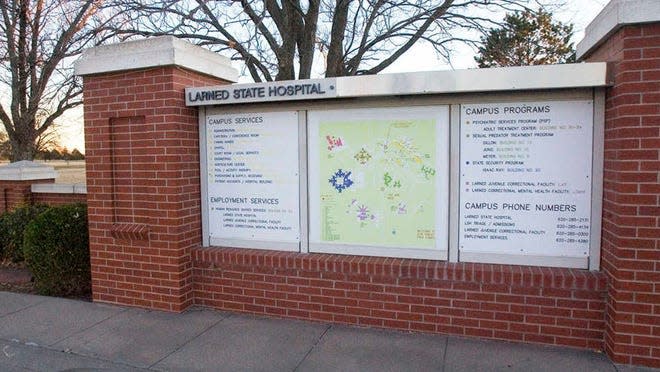Lawsuit says Kansas must tackle nearly yearlong wait times at Larned State Hospital

A lawsuit filed Thursday alleges that long wait times at Larned State Hospital are unconstitutional and are inflicting mental and physical harm on those who are incarcerated.
The complaint, brought in federal district court by the ACLU of Kansas, National Police Accountability Project and a Kansas City, Mo., law firm, says individuals are frequently waiting nearly a year in jail for an evaluation to determine if they are competent to stand trial.
And patients determined unfit to stand trial also will have prolonged waits if they must be sent back to Larned for care so they might become competent to be tried.
While individuals are sitting in jail their criminal proceedings are paused. They are unable to access psychiatric treatment and are often placed in solitary confinement, something ACLU legal director Sharon Brett said is "cruel and unusual punishment."
"We felt like action was desperately needed and really (was) needed yesterday," Brett said in an interview.
Wait times average 11 months amid reduced capacity
Filed on behalf of four "next friends," or legal or parental representatives of individuals currently on the waiting list, the suit alleges the long waiting times violate the due process clause of the 14th Amendment to the U.S. Constitution, the Kansas Constitution and the Americans with Disabilities Act.
The groups are asking a judge to instruct the Kansas Department for Aging and Disability Services, which runs Larned, to do away with the waiting lists and instead show how they will take action to more quickly provide competency evaluations and treatment.
Larned has been running at reduced capacity in its forensic evaluation unit for some time, in large part due to staffing issues. The State Security Program, which conducts competency evaluation and restoration, had only 78 of its 120 beds operational.
While more funding was provided in 2021 to boost capacity, limited staffing made it impossible to do so. Legislative testimony provided by KDADS in February showed almost half of direct care staff positions and three-quarters of licensed practical nurse slots are unfilled.
The number of individuals on the waitlist, meanwhile, has increased markedly since January 2020, rising to 167 at the end of 2021. The average wait time has also gone up, hitting 336 days in December.
Brett said courts elsewhere have taken states to task for wait times longer than 30 days.
"Due to the egregiously long wait for bed space at Larned, some individuals spend more time in county jails, pretrial, waiting to be admitted to Larned than they would ever receive as a sentence if convicted," the lawsuit said.
One man, called "C.B." in the lawsuit, is currently being held at the Shawnee County Jail.
C.B. has been waiting for an evaluation at Larned since January. His psychotic disorder is so serious that a doctor has recommended he be held in a hospital until he can be stabilized in order to minimize risk to others.
"Earlier in his incarceration, C.B. was in solitary confinement and on suicide watch," the lawsuit said. "The jail is extremely short-staffed and on information and belief, many detainees spend most of the day locked down in their cells — especially individuals with acute mental illness."
State officials, law enforcement seek solutions on wait times
State lawmakers and KDADS have long sought solutions to the problem.
A group of sheriffs sent a letter to Gov. Laura Kelly in October calling for a change in leadership at the hospital, saying conditions there had reached a "crisis level."
Legislation signed by Kelly earlier this year would expand the use of so-called mobile competency units, where an evaluation can be performed in a county jail in a shorter timeframe.
A KDADS pilot is currently operational in 21 counties, the agency says, and evaluations can take place via telemedicine or in the community for those on pre-trial release.
"Although the enacted legislation provides more options for competency evaluation and treatment, it is unclear what impact, if any, the reforms will have on wait times for beds at Larned," the lawsuit said. "HB 2508 therefore represents a step in the right direction, but it is an incomplete solution to the unconstitutional wait times currently in place."
More: A new suicide prevention hotline is coming — what if the Kansas Legislature doesn't fund it?
Andrew Bahl is a senior statehouse reporter for the Topeka Capital-Journal. He can be reached at abahl@gannett.com or by phone at 443-979-6100.
This article originally appeared on Topeka Capital-Journal: Kansas sued over Larned State Hospital's nearly year-long wait times

